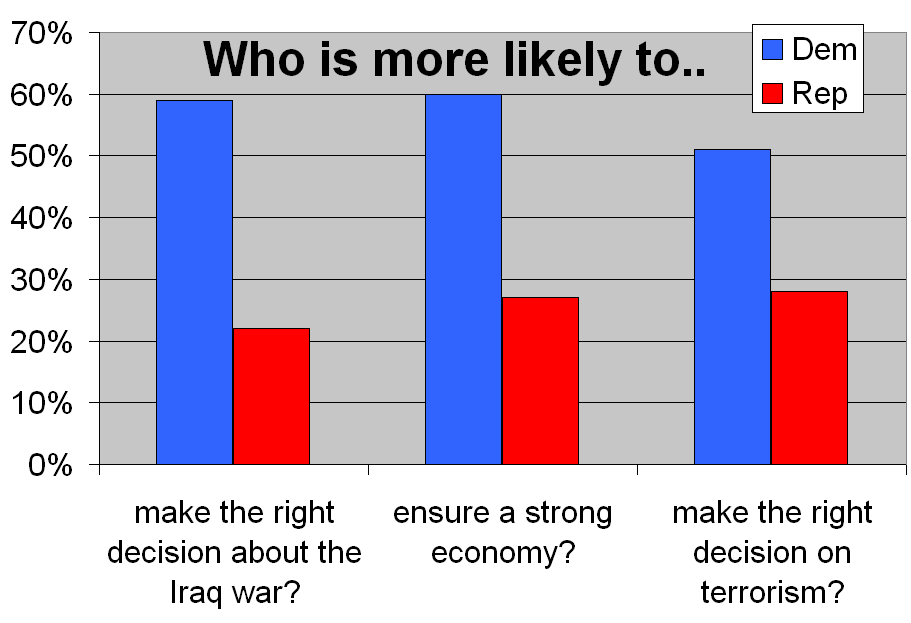
| About Free Subscription Donate Contact Links Archives | ||||||||||||||||||||||||||||||||||||||||||||||||||||||||||||||||||||||||||||||||||||||||||||||||||||||||||||||||||||||||||||||||||||||||||||||||||||||||||||||||||||||||||||||||||||||||||||||||||||||||||||||||||||||||||||||||||||||||||||||||||||||||||||||||||||||||||||||||||||||||||||||||||
2006 Annual Survey Of American Jewish Opinion GOP efforts to sway Jewish voters have floundered. -- Ira Forman The American Jewish Committee's (AJC) 2006 Annual Survey of American Jewish Opinion shows that the number of Jewish voters identifying themselves as Democrats has increased from 48 percent to 54 percent since the last mid-term election in 2002. At the same time, the number of Jewish voters identifying themselves as Republicans has decreased from 18 percent in 2002 to 15 percent in 2006. September 25 -- October 16, 2006 -- American Jewish Committee Introduction The data reported here are from the 2006 Annual Survey of American Jewish Opinion, sponsored by the American Jewish Committee, detailing the views of American Jews about a broad range of subjects. Among the topics covered in the present survey are the campaign against terrorism and the war in Iraq, the Israel-Arab conflict, the attachment of American Jews to Israel, political and social issues in the United States, Jewish perceptions of anti-Semitism, Jewish opinion about various countries, and Jewish identity concerns. Some of the questions appearing in the survey are new; others are drawn from previous American Jewish Committee surveys, including the Annual Survey of American Jewish Opinion carried out in 1997, 1998, 1999, 2000, 2001, 2002, 2003, 2004, and 2005. The 2006 survey was conducted for the American Jewish Committee by Synovate (formerly Market Facts), a leading survey-research organization. Respondents were interviewed by telephone between September 25 - October 16, 2006; no interviewing took place on the Sabbath and Jewish holidays. The sample consisted of 958 self-identifying Jewish respondents selected from the Synovate consumer mail panel. The respondents are demographically representative of the United States adult Jewish population on a variety of measures. The margin of error for the sample as a whole is plus or minus 3 percentage points. A. INTERNATIONAL AFFAIRS
B. ISRAEL
C. NATIONAL AFFAIRS
D. ANTI-SEMITISM
| ||||||||||||||||||||||||||||||||||||||||||||||||||||||||||||||||||||||||||||||||||||||||||||||||||||||||||||||||||||||||||||||||||||||||||||||||||||||||||||||||||||||||||||||||||||||||||||||||||||||||||||||||||||||||||||||||||||||||||||||||||||||||||||||||||||||||||||||||||||||||||||||||||
| Most | Many | Some | Very few | None | Not sure | |||||||||||||||||||||||||||||||||||||||||||||||||||||||||||||||||||||||||||||||||||||||||||||||||||||||||||||||||||||||||||||||||||||||||||||||||||||||||||||||||||||||||||||||||||||||||||||||||||||||||||||||||||||||||||||||||||||||||||||||||||||||||||||||||||||||||||||||||||||||||||||
| a. Asians |
2 |
4 |
37 |
38 |
10 |
8 |
||||||||||||||||||||||||||||||||||||||||||||||||||||||||||||||||||||||||||||||||||||||||||||||||||||||||||||||||||||||||||||||||||||||||||||||||||||||||||||||||||||||||||||||||||||||||||||||||||||||||||||||||||||||||||||||||||||||||||||||||||||||||||||||||||||||||||||||||||||||||||||
| b. Muslims |
32 |
27 |
29 |
6 |
1 |
5 |
||||||||||||||||||||||||||||||||||||||||||||||||||||||||||||||||||||||||||||||||||||||||||||||||||||||||||||||||||||||||||||||||||||||||||||||||||||||||||||||||||||||||||||||||||||||||||||||||||||||||||||||||||||||||||||||||||||||||||||||||||||||||||||||||||||||||||||||||||||||||||||
| c. Hispanics |
2 |
6 |
46 |
31 |
6 |
8 |
||||||||||||||||||||||||||||||||||||||||||||||||||||||||||||||||||||||||||||||||||||||||||||||||||||||||||||||||||||||||||||||||||||||||||||||||||||||||||||||||||||||||||||||||||||||||||||||||||||||||||||||||||||||||||||||||||||||||||||||||||||||||||||||||||||||||||||||||||||||||||||
| d. Blacks |
5 |
16 |
55 |
17 |
3 |
5 |
||||||||||||||||||||||||||||||||||||||||||||||||||||||||||||||||||||||||||||||||||||||||||||||||||||||||||||||||||||||||||||||||||||||||||||||||||||||||||||||||||||||||||||||||||||||||||||||||||||||||||||||||||||||||||||||||||||||||||||||||||||||||||||||||||||||||||||||||||||||||||||
| e. Evangelical Protestants |
9 |
15 |
41 |
20 |
5 |
11 |
||||||||||||||||||||||||||||||||||||||||||||||||||||||||||||||||||||||||||||||||||||||||||||||||||||||||||||||||||||||||||||||||||||||||||||||||||||||||||||||||||||||||||||||||||||||||||||||||||||||||||||||||||||||||||||||||||||||||||||||||||||||||||||||||||||||||||||||||||||||||||||
| f. Catholics |
5 |
10 |
53 |
24 |
4 |
5 |
|
30. Do you think
that anti-Semitism in the Muslim world is currently a very
serious problem, somewhat of a problem, or not a problem
at all?
|
|
|
Very serious problem |
73
|
|
Somewhat of a problem |
23
|
| Not a problem at all |
2 |
| Not sure |
3 |
|
31. Looking ahead
over the next several years, do you think that
anti-Semitism around the world will increase greatly,
increase somewhat, remain the same, decrease somewhat, or
decrease greatly?
|
|
|
Increase greatly |
17 |
|
Increase somewhat |
36
|
| Remain the same |
36 |
| Decrease somewhat |
7 |
| Decrease greatly |
1 |
| Not sure |
3 |
E. JEWISH IDENTITY
|
32. How important
would you say being Jewish is in your own life?
|
|
|
|
|
|
33. Do you think of
yourself as ...
|
|
|
Orthodox |
8
|
|
Conservative |
33
|
|
Reconstructionist |
2
|
|
Reform |
31
|
|
Just Jewish |
24
|
|
Not sure |
2
|
|
34.Do you belong to a
synagogue or temple?
|
|
|
Yes |
53
|
|
No |
46
|
|
35. How close do you
feel to Israel?
|
|
|
Very close |
37 |
|
Fairly close |
39
|
| Fairly distant |
16 |
| Very distant |
6 |
| Not sure |
2 |
|
36. Do you agree or
disagree with the following statement? ?Caring about
Israel is a very important part of my being a Jew."
|
|
|
|
© 2006. Permission is hereby granted to redistribute this issue of The Philadelphia Jewish Voice or (unless specified otherwise) any of the articles therein in their full original form provided these same rights are conveyed to the reader and subscription information to The Philadelphia Jewish Voice is provided. Subscribers should be directed to http://www.pjvoice.com/Subscribe.htm.









